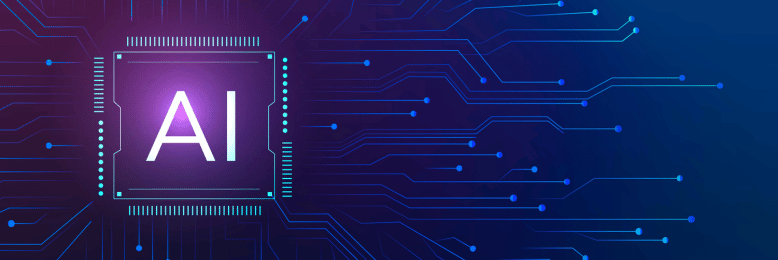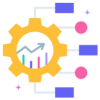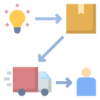How Artificial Intelligence (AI) Can Make Your Business More Efficient
September 26th, 2023 | 4 min. read
%20-%202023-09-25T203258.297.jpg)
When you hear artificial intelligence (AI) for business, the first words that might come to your mind are cost and risk. If that's true for you, you're not alone. In fact, many business owners feel wary of implementing AI across their organizations because of those two things. Unfortunately, in today's increasingly digital landscape, you could miss out on some significant benefits by foregoing machine learning and automation technology.
Intelligent Technical Solutions (ITS) has helped hundreds of businesses implement AI to improve their operational efficiency. From our experience, the benefits of machine learning trump the cost and risk of implementing it when it's done right.
In this article, we'll discuss how AI can help make your business more efficient so you can make a smarter decision about whether the technology is right for you.

How Does AI Make Your Business More Efficient?
Let's be clear: simply implementing AI doesn't mean you get all the advantages. It's crucial to approach AI integration thoughtfully and align its use with your unique business goals. In addition, you also need to ensure your team is ready to collaborate effectively with machine learning systems. Doing all of that will help you maximize the benefits of AI for your organization.
Once you're able to set it up properly, however, your company will unlock unprecedented levels of efficiency and innovation. Check out below some of the ways AI can make your organization more efficient:
1. Automating Routine Tasks
 AI's prowess in automating mundane and repetitive tasks extends beyond relieving your workforce of tedious chores. By leveraging AI-powered bots and software, you can streamline processes such as data entry, invoice processing, and appointment scheduling. This not only reduces human error but also accelerates workflows, allowing your employees to allocate their time and energy toward more strategic, innovative endeavors that drive growth.
AI's prowess in automating mundane and repetitive tasks extends beyond relieving your workforce of tedious chores. By leveraging AI-powered bots and software, you can streamline processes such as data entry, invoice processing, and appointment scheduling. This not only reduces human error but also accelerates workflows, allowing your employees to allocate their time and energy toward more strategic, innovative endeavors that drive growth.
2. Data Analysis and Insights
 The sheer volume of data generated by modern businesses can be overwhelming to human analysts. Data analytics is where AI excels. AI algorithms can sift through mountains of data with remarkable speed and precision, uncovering intricate patterns and insights that could otherwise remain hidden. By harnessing these insights, your business gains a competitive edge in making informed decisions, tailoring marketing strategies, identifying emerging trends, and adapting to rapidly evolving market dynamics.
The sheer volume of data generated by modern businesses can be overwhelming to human analysts. Data analytics is where AI excels. AI algorithms can sift through mountains of data with remarkable speed and precision, uncovering intricate patterns and insights that could otherwise remain hidden. By harnessing these insights, your business gains a competitive edge in making informed decisions, tailoring marketing strategies, identifying emerging trends, and adapting to rapidly evolving market dynamics.
3. Personalized Customer Experience
 AI's ability to analyze vast datasets empowers your business to offer personalized experiences to customers. Through sophisticated data analysis, AI understands customer preferences, purchase history, and browsing behavior. You can deliver highly targeted product recommendations and tailored marketing messages by leveraging this data. This personalization not only enhances customer satisfaction but also cultivates deeper customer loyalty and engagement.
AI's ability to analyze vast datasets empowers your business to offer personalized experiences to customers. Through sophisticated data analysis, AI understands customer preferences, purchase history, and browsing behavior. You can deliver highly targeted product recommendations and tailored marketing messages by leveraging this data. This personalization not only enhances customer satisfaction but also cultivates deeper customer loyalty and engagement.
4. Predictive Analytics
 AI's predictive capabilities go beyond mere analysis; they extend into forecasting future trends and outcomes. By dissecting historical data, AI algorithms can forecast demand patterns, aid in precise inventory management, optimize production schedules, and anticipate maintenance needs. This predictive approach minimizes operational inefficiencies, reduces costs, and ensures resources are allocated where needed most.
AI's predictive capabilities go beyond mere analysis; they extend into forecasting future trends and outcomes. By dissecting historical data, AI algorithms can forecast demand patterns, aid in precise inventory management, optimize production schedules, and anticipate maintenance needs. This predictive approach minimizes operational inefficiencies, reduces costs, and ensures resources are allocated where needed most.
5. Enhanced Marketing and Sales
 AI revolutionizes marketing and sales by presenting actionable insights derived from customer data. That enables data-driven decision-making, helping businesses tailor their marketing efforts to specific customer segments. Furthermore, AI can automate lead scoring, identifying potential high-value leads for your sales team to focus on, ultimately increasing conversion rates and revenue.
AI revolutionizes marketing and sales by presenting actionable insights derived from customer data. That enables data-driven decision-making, helping businesses tailor their marketing efforts to specific customer segments. Furthermore, AI can automate lead scoring, identifying potential high-value leads for your sales team to focus on, ultimately increasing conversion rates and revenue.
6. Process Optimization
 At the core of AI's impact lies its potential to optimize processes. By analyzing workflows, AI can identify bottlenecks, redundancies, and inefficiencies. With these insights, you can:
At the core of AI's impact lies its potential to optimize processes. By analyzing workflows, AI can identify bottlenecks, redundancies, and inefficiencies. With these insights, you can:
- Restructure processes,
- Automate manual tasks, and
- Reallocate resources for maximum productivity.
This optimization accelerates task completion and contributes to a leaner, more cost-effective operational framework.
7. Quality Control and Assurance
 AI-driven quality control ensures that your products meet stringent standards. Through real-time monitoring of manufacturing processes, AI can detect defects or irregularities early, preventing substandard products from reaching customers. That enhances product quality, reduces waste, and safeguards your brand's reputation.
AI-driven quality control ensures that your products meet stringent standards. Through real-time monitoring of manufacturing processes, AI can detect defects or irregularities early, preventing substandard products from reaching customers. That enhances product quality, reduces waste, and safeguards your brand's reputation.
8. Risk Management
 Businesses can gain a comprehensive view of potential risks and opportunities by leveraging AI's analytical capabilities. AI can identify emerging trends, assess market volatility, and predict future scenarios by analyzing intricate relationships within vast datasets. With these insights, your business can proactively mitigate risks and capitalize on emerging opportunities, fostering a more resilient and agile enterprise.
Businesses can gain a comprehensive view of potential risks and opportunities by leveraging AI's analytical capabilities. AI can identify emerging trends, assess market volatility, and predict future scenarios by analyzing intricate relationships within vast datasets. With these insights, your business can proactively mitigate risks and capitalize on emerging opportunities, fostering a more resilient and agile enterprise.
9. Supply Chain Management
 The dynamic nature of supply chains demands precision and adaptability. AI aids in achieving both by analyzing historical and real-time data to predict demand fluctuations, optimize inventory levels, and propose efficient shipping routes. This results in reduced delays, minimized carrying costs, and a more efficient and responsive supply chain ecosystem overall.
The dynamic nature of supply chains demands precision and adaptability. AI aids in achieving both by analyzing historical and real-time data to predict demand fluctuations, optimize inventory levels, and propose efficient shipping routes. This results in reduced delays, minimized carrying costs, and a more efficient and responsive supply chain ecosystem overall.
10. Employee Training and Productivity
 AI-driven learning platforms revolutionize employee training. It maximizes knowledge retention and engagement by tailoring training materials to individual learning styles and preferences. Moreover, AI can offer real-time assistance, suggesting relevant resources or solutions to employees and enhancing their productivity and problem-solving capabilities.
AI-driven learning platforms revolutionize employee training. It maximizes knowledge retention and engagement by tailoring training materials to individual learning styles and preferences. Moreover, AI can offer real-time assistance, suggesting relevant resources or solutions to employees and enhancing their productivity and problem-solving capabilities.
11. Fraud Detection
 In the realm of security, AI's pattern recognition abilities shine. It can swiftly identify deviations by analyzing transaction data, user behavior, and network activity. This enables early detection of fraudulent activities, ensuring swift action to safeguard your company's assets and protect sensitive customer information.
In the realm of security, AI's pattern recognition abilities shine. It can swiftly identify deviations by analyzing transaction data, user behavior, and network activity. This enables early detection of fraudulent activities, ensuring swift action to safeguard your company's assets and protect sensitive customer information.
12. Human Resources Management
 AI transforms HR functions, automating tasks like candidate screening and onboarding. Additionally, AI can analyze employee performance data to provide valuable insights for performance evaluations, identify training needs, and assist in talent management strategies. This optimizes workforce productivity and development.
AI transforms HR functions, automating tasks like candidate screening and onboarding. Additionally, AI can analyze employee performance data to provide valuable insights for performance evaluations, identify training needs, and assist in talent management strategies. This optimizes workforce productivity and development.
13. Language Translation and Communication
 The global nature of business demands effective cross-cultural communication. AI-powered language translation tools break down language barriers, facilitating seamless communication with international clients, partners, and employees. This fosters collaboration, expands market reach, and opens doors to new opportunities.
The global nature of business demands effective cross-cultural communication. AI-powered language translation tools break down language barriers, facilitating seamless communication with international clients, partners, and employees. This fosters collaboration, expands market reach, and opens doors to new opportunities.
Ready to Implement AI for Your Business?
AI is a powerful tool that can help your organization unlock new capabilities and free up your team so they can focus on more important tasks. It's a great way to improve your efficiency that can outweigh the cost if done right.
ITS has helped dozens of organizations boost efficiency with AI and automation tools. If you want to learn more about how to align AI implementation with your business goals, get a free IT consultation from one of our experts. You can also check out the following resources to learn more about the technology:
Mark Sheldon Villanueva has over a decade of experience creating engaging content for companies based in Asia, Australia and North America. He has produced all manner of creative content for small local businesses and large multinational corporations that span a wide variety of industries. Mark also used to work as a content team leader for an award-winning digital marketing agency based in Singapore.
Topics:
